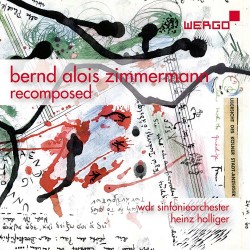 Bernd Alois Zimmermann – Recomposed
Bernd Alois Zimmermann – Recomposed
WDR Sinfonieorchester; Heinz Holliger
Wergo WER73872 (amazon.ca/dp/B0BD2CQLGT?ref_=cb_interstitial_us_ca_desktop_unrec_referrer_google_dp_dp)
In the context of German post-war avant-garde composition, B.A. Zimmermann was an outlier. Rising out of the chaos of the Second World War, there formed in Darmstadt a radical circle of composers who sought a total break with tradition. Zimmermann reflected these influences at times, notably so in his epic opera Die Soldaten, but stubbornly left himself open to a myriad of influences throughout his career. Consequently, he was viewed with considerable suspicion by the aesthetic hard-liners. As Heinz Holliger explains in the superb program notes accompanying these recordings, “Zimmermann had no aesthetic prejudices. This was of course born of necessity, since he had chosen to earn his money as a house composer for WDR [West German Radio], and not as a piano or composition teacher.” Following the reform of the radio network in 1947, he completed approximately 100 arrangements for live broadcasts from Cologne which until now have languished in obscurity. Now at last, his finest examples in this genre are brought back to life, interspersed with selections of his own symphonic music in performances of the highest quality.
Disc One delights with a predominantly Latin disposition, opening with Zimmerman’s major ballet work from the 1950s, Alagoana. The polytonality and overt Brazilian references à la Milhaud also bring to mind the music of Argentine composer Alberto Ginastera’s folkloristic ballets of the 1940s, though Zimmermann’s chromaticism is considerably more advanced. Lavishly orchestrated arrangements of piano pieces by Milhaud, Villa-Lobos and Casella along with Zimmermann’s own contributions in this genre maintain the bucolic mood. We return to Europe for the closing selections, concluding with Zimmermann’s hilariously parodistic suite of Rhineland Carnival Dances.
Disc Two features Zimmermann’s affinity for Eastern European music in the form of arrangements of works by Mussorgsky, Rachmaninoff and Liszt. Two substantial Liszt selections feature the dramatic delivery of soprano Sarah Wegener. Zimmermann’s own works include Kontraste (1953), an unashamedly tonal suite of poly-stylistic dances for an imaginary ballet, a brief and breezy Concertino (1950) for piano and orchestra on a theme of Rachmaninoff, and the revised version of his substantial orchestral Konzert (1946/49) in four movements which demonstrates at this early stage of his career the lingering influence of Hindemith.
Disc Three features a grab-bag of arrangements of pleasant tunes by Smetana, Dvořák and Kodály among others. Vater and Sohn (1938), after Paul Haletski, and Edmund Nick’s Blues (1929) in particular are graced with sophisticated orchestrations. Zimmermann’s own music again bookends the disc, pairing the 1953 version of his one movement Symphony, an expressionistic work culminating in a cataclysmic march that evokes the horrors of war (he was drafted into the Wehrmacht from 1940 to 1942), and concludes with his last work for orchestra, the brooding, blues-influenced Stille und Umkehr. This ritualistic work, obsessively centred on a recurring middle D, was composed in 1970 during his stay at a psychiatric hospital. Plagued by recurring depression and rapidly deteriorating eyesight, he committed suicide later that year at the age of 52.



